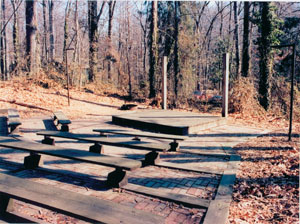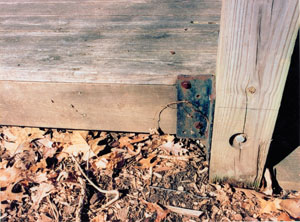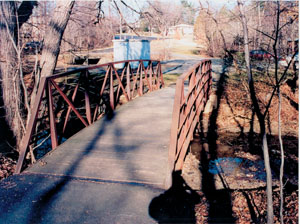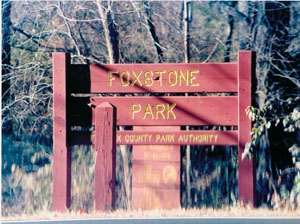
The money belonged to Russian spies, and to this day, it’s the Hefty bag full of used hundred-dollar bills that haunts Greg Zell. “Every once in a while I think, I could have had $50,000,” says Zell, a natural resource expert for Arlington County.
The bag was left in an odd place—tucked beneath the outdoor stage of Long Branch Nature Center (where Zell serves as executive director) in a wooded spot that’s usually the setting for family movie nights. Most people have never heard about what happened at Long Branch the week after the money was discovered in February 2001, when a team of FBI agents hid in a closet, glued to surveillance equipment in the hope of intercepting its intended recipient.
It’s the end of the story that’s familiar—the arrest of Robert Hanssen, one of the most damaging spies in U.S. history.

Long Branch Nature Center sits just off Carlin Springs Road, about two miles south of Ballston Common Mall. An unlikely site for international espionage, it’s better known for another type of covert operative: the flying squirrel.
Like spies, flying squirrels are common in the Washington area. Although they live in our backyards, most people have never spotted one because, like spies, these stealth creatures are elusive. They come out only after dark, gliding from tree to tree on membranes stretched between their legs, searching for fruit, nuts and insects.
And they’re extremely cautious. As soon as one lands on a tree trunk, it immediately darts to the other side to foil any predator that might have picked up its trail. Long Branch has lured its flying squirrels into regularly visiting feeding stations where visitors can watch the animals after sunset. They’ve been featured on Animal Planet twice.
But it wasn’t the resident wildlife that prompted a visit from two men in dark suits on a cold Tuesday morning, Feb. 13, 2001. Bypassing the feeding stations, they entered the nature center’s low green building, crossed the front area with its glass aquariums full of snakes and turtles, and headed for the all-purpose room at the back. The day before, the FBI had found the money stashed under the stage of the amphitheater. Park naturalist Alonso Abugattas, who was getting ready to lead a nature program called “Tiny Tots,” didn’t know that.
“So here we are,” Abugattas recalls, “a whole bunch of moms with their little toddlers. The program’s about to take place, and there are two men without kids there, and they definitely don’t fit in.”
When Abugattas asked the men if they needed help, they took him aside, asked to see his supervisor and revealed that they were FBI agents. Abugattas thought maybe one of his co-workers had done something sketchy.
But the agents weren’t gunning for Arlington County employees. They were laying a trap for a much more formidable adversary.
From the outside, the agents’ quarry looked like a typical Washington-area resident. A 56-year-old government worker just six weeks shy of retirement, Hanssen lived about 10 miles away in a split-level house on Talisman Drive in Vienna, a home he shared with his wife, kids and a dog that liked to play Frisbee. He had worked for the FBI since 1976, mostly in counterintelligence.


The FBI agents knew that a spy using the code name “Ramon Garcia” had been selling extremely sensitive information to the Russians for the past 15 years. For his trouble, this man had received at least $600,000 in cash and several diamonds. The agents also knew at this point that Ramon Garcia and Robert Hanssen were, in fact, the same person.
Although Hanssen first dipped his toe into the espionage world in 1979 (when he briefly sold secrets to the Russian military intelligence agency, GRU), his spying career really accelerated in 1985, when he wrote a letter to KGB Col. Victor Cherkashin, an official attached to the Soviet Embassy in Washington, D.C. As an agent in the FBI’s Soviet analytical unit, Hanssen was tasked to study Soviet spies operating in the U.S. and determine whether those who volunteered their services to the FBI were genuine moles, or merely Soviet plants. Through this work, he knew that Cherkashin, in addition to his embassy post, handled double agents for Moscow.
The spycraft displayed in Hanssen’s first letter to Cherkashin was, in many ways, top-notch. In it, Hanssen disclosed the names of three KGB agents who were secretly working in the U.S. as FBI operatives, asking for $100,000 in cash in exchange for his services. For this and future transactions, he proposed making exchanges using a “dead drop” system in which he and his handlers would leave packages for each other in public places.
Employing dead drops meant that Hanssen never had to meet his handlers, identify his employer or reveal his real name. To signal when packages had been dropped off or picked up, the conspirators attached adhesive tape or thumbtacks to designated signs and telephone poles. (One letter directing Hanssen to use white and yellow thumbtacks included this helpful tip: “Colored sets are sold at CVS.”) Using the dead-drop system, Hanssen ultimately handed over more than 6,000 pages of classified documents and more than two dozen computer disks.
As FBI Director Louis Freeh would later state upon Hanssen’s arrest, “Hanssen…was assigned to a variety of national security posts that legitimately provided him access to classified information…[and] he was keenly aware of the gravity of his traitorous actions.”
In some cases, those actions proved deadly. “He…independently disclosed the identity of two KGB officials who, first compromised by Aldrich Ames, had been recruited by the U.S. government to serve as ‘agents in place’ at the Soviet Embassy in Washington,” Freeh said, quoting from the affidavit. “When those two KGB officials returned to Moscow, they were tried and convicted on espionage charges and executed.”
In one letter to his KGB handler, Hanssen acknowledged the similar severity with which U.S. law punishes acts of treason, writing, “…I know far better than most what minefields are laid and the risks.”
By the late 1990s, FBI analysts began noticing a pattern of compromised operations and suspected leaks from inside their own ranks. Their suspicions were confirmed in the fall of 2000, when FBI agents persuaded an unnamed member of Russian intelligence (whose identity has never been revealed) to defect after stealing the actual KGB file relating to the man known as Ramon Garcia—enough documents and computer disks to fill a small suitcase. The file contained two especially tantalizing pieces of evidence: an audiotape of a telephone conversation with Garcia, and a small package labeled “Don’t open this.” The FBI paid $7 million for the lot.
At first, the tape recording yielded only frustration; one of the agents recognized the voice, but couldn’t quite place it. Then another agent, reading through Garcia’s letters, noticed an unusual obscenity, “purple-pissing,” and remembered where he’d heard it before. Bob Hanssen had used it, quoting Gen. George S. Patton, who famously used the phrase “purple-pissing Japanese” during World War II. With the connection made, agents finally recognized the voice. And when the mysterious package was opened, it contained a scrap of garbage bag that Garcia had used to wrap some documents. The fingerprints on it belonged to Robert Hanssen.
The mystery was solved, but the FBI needed evidence that would prove ironclad in court. Hoping to catch Hanssen in the act, investigators bugged his Ford Taurus, tapped his phone and—in a serendipitous turn of events—even managed to buy the house across the street from his when it went on sale.
The linchpin, though, was the purloined file, which held detailed information about Hanssen’s clandestine operations, including a list of all the drop sites he used and their code names. The FBI learned that a drop had been scheduled for Nov. 21, 2000, at a site with the code name LEWIS, aka Long Branch Nature Center. According to the documents, the Russians had signaled a drop there by placing a horizontal piece of white tape on the telephone pole near the intersection of Carlin Springs Road and South Third Street.


Strangely enough, that bag of unmarked bills had gone unclaimed for nearly three months. Finding it intact, FBI agents took it to the lab on Feb. 12, 2001, photographed the money and then put it back under the stage with hopes that Hanssen would yet appear to retrieve it.
The next day, when FBI agents interrupted Abugattas’ “Tiny Tots” program, he sent them to see his boss, Greg Zell.
“I was sitting in my office, and I have a little bit of law enforcement background,” recalls Zell, who grew up in Arlington, studied criminal justice and worked as a firearms instructor for many years before becoming a park ranger. “You can usually spot an FBI agent, really neat and tidy, nice haircut,” he says. “[They] explained that they were investigating a drug ring… they asked for my permission to install some surveillance equipment.”
After rigging the amphitheater, the agents kept to their closet for six days, emerging only during shift changes. During the night, they came and went under the glittering eyes of a taxidermied beaver, a stuffed bobcat and a slightly tatty red fox that stands near the nature center’s windows with one paw eternally lifted, as if posing for a photograph.
But, in a sequence of events that ultimately resembled Get Smart more than Mission: Impossible, the mission didn’t go smoothly. Although FBI agents asked the nature center staff not to set the building alarms (and they complied), there was a wrinkle involving a contractor who was renovating the building—a job that required him to demolish and reconstruct some of the animal pens. Hating to see the squirrels and turtles confined to small, temporary cages any longer than necessary, the contractor stayed late several nights in a row, hurrying to rebuild the enclosures as quickly as possible. These were the same nights that the FBI lay in waiting.
“One night,” said Abugattas, “[the contractor] noticed that the alarm wasn’t on. And not wanting for me to get into trouble, he figured, ‘I’ll put the alarm on for him.’ Which of course was a mistake.”
The next time an agent left the closet, the burglar alarm went off, blaring into the surrounding woods. “I lived in Arlington, so I was the first one on the call list,” says Abugattas, who lived in Bluemont at the time, near the intersection of Washington Boulevard and Glebe Road. “[When I arrived] they were waiting at the door, and they were so upset. It was audible all around, when they were trying to be covert about it.”
Abugattas didn’t witness the second glitch that week—one that occurred in broad daylight, but was potentially far worse than the alarm incident. FBI agents watched their surveillance monitors, helpless and aghast, as a curious little boy reached under the amphitheater stage and pulled out the hidden bag of money. The operation got back on track a moment later, when the boy’s mother chided him for playing with trash and pulled his hand away, leaving the bag unopened.
Sunday, Feb. 18, marked day six of the surveillance at Long Branch. But Robert Hanssen never made the trip to Arlington that afternoon. Rather, he drove to Foxstone Park in Vienna (a drop site code-named ELLIS), placed a package under a footbridge and heard the chilling words, “Freeze! FBI!”
According to those at the scene, he replied, “What took you so long?”
Two days later, the nature center received a visit from a local news crew. That’s when Zell and Abugattas learned that their alleged drug dealer was really a spy.
Not long after, an FBI agent stopped by Long Branch to thank the staff for cooperating in the investigation. “I told the agent that I had walked around that amphitheater a couple times and I could have just tripped over that thing and found it, $50,000 right there!” Zell says. “And he said, ‘The funny thing is, you probably could have kept it.’ ”
Since it’s highly unlikely that the Russians would have risked exposure and arrest to reclaim their money, the agent explained, it would eventually, under U.S. law, belong to the person who found it.
Why didn’t Hanssen ever pick up the money under the stage? “This is just conjecture,” Abugattas says, “but maybe [he] never got the signal for the pickup.” Perhaps the tape on the telephone pole was washed off by severe weather, or ripped down by a passerby, he theorizes. One may never know.
It’s been more than a decade since Hanssen was sentenced to life imprisonment without the possibility of parole, but Abugattas still tells the story once or twice a year at a special “Hanssen Spy Talk” event for adults at the nature center. Even now, he’s still uncovering new insights into what actually happened that week.
At one of the presentations, about a year after the double agent’s arrest, a woman who lived in the Glencarlyn neighborhood bordering Long Branch approached a park ranger after the show to describe a strange incident that she believed took place during the surveillance. “Her dog… ran off the trail,” Abugattas says, “and found a person dressed in camouflage, hiding in the woods. She came back and called the police. But I bet you what she found was an FBI agent.”
Was the man in camouflage, in fact, a federal agent on the prowl for Robert Hanssen? Or was there possibly a different covert operation going on in the park? The flying squirrels, who see everything that happens at Long Branch after dark, aren’t telling.
Laurie McClellan is a writer and photographer who lives in Arlington. She’s spotted herons, owls, raccoons and deer near Long Branch, but no spies yet.
